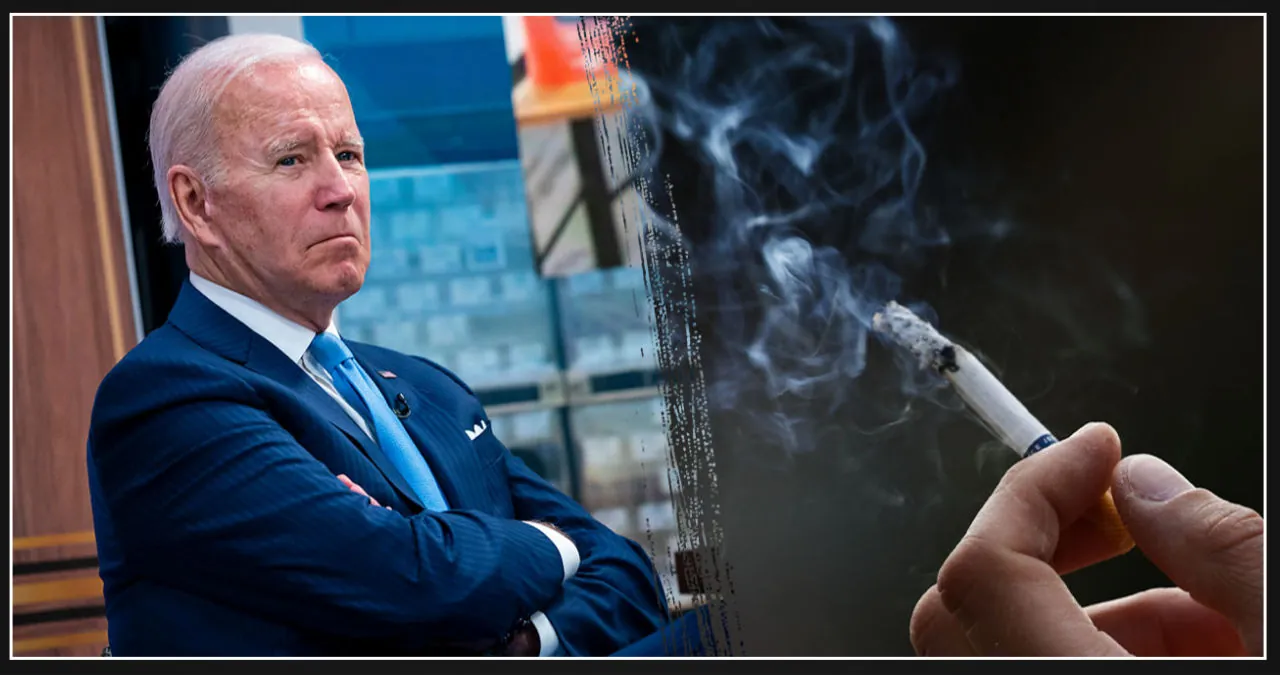Dr. Marc Siegel, senior medical analyst at Fox News, along with Fox News correspondent Alexandria Hoff, delved into the topic of ultra-processed foods and the associated health risks on the show ‘America Reports.’
The FDA, under the Biden administration, has taken a significant step towards banning cigarettes that are currently available in the market. This move aims to promote the use of cigarettes with lower levels of nicotine.
The U.S. Food and Drug Administration has proposed a rule that, if approved, would restrict the level of nicotine in cigarettes and other combusted tobacco products, aiming to make them minimally or nonaddictive. This groundbreaking action by the United States would make it the first country in the world to take such a decisive step toward preventing and reducing smoking-related diseases and fatalities. The FDA expressed its commitment to saving lives through this measure in a statement released on Wednesday.
The FDA originally expressed its intention to propose a rule in 2018, and today’s announcement marks a significant milestone in the rulemaking process. The agency plans to gather feedback on the proposal through public comment and the FDA’s Tobacco Products Scientific Advisory Committee.
The “Tobacco Product Standard for Nicotine Level of Certain Tobacco Products” recently passed a regulatory hurdle. However, it is important to note that the rule has not been published or finalized as of yet.
The Biden administration’s last-minute proposal to effectively ban cigarettes has raised concerns among experts who argue that it could inadvertently benefit cartels. The move, which has been described as a “gift” to criminal organizations, aims to address public health concerns related to smoking. However, critics believe that such a ban could create a lucrative black market for cigarettes, providing an opportunity for cartels to exploit the demand. This raises questions about the unintended consequences of the proposed policy and its potential impact on criminal activities.
President Biden’s administration is taking steps to ban cigarettes with higher levels of nicotine. The FDA, under President Biden’s leadership, is working towards implementing this ban to reduce the harmful effects of smoking. This move aims to protect public health and promote a healthier society.
“Many administrations have recognized the tremendous potential of a proposal like this to address the impact of tobacco-related diseases,” expressed FDA Commissioner Robert M. Califf, M.D. “The proposal envisions a future where young people are less likely to use cigarettes, and current smokers have the opportunity to quit or switch to less harmful alternatives. If finalized, this action could save numerous lives, significantly reduce the burden of severe illnesses and disabilities, and also result in substantial cost savings. It is my hope that we can all unite in our pursuit of this commendable goal – the significant reduction of the leading cause of preventable death and disease in the United States.”
The FDA’s press release clarifies that the intention of the proposed rule is not to ban cigarettes or any other tobacco products. Rather, it aims to limit the nicotine level in cigarettes and certain combusted tobacco products to 0.7 milligrams per gram of tobacco. This proposed cap is considerably lower than the average nicotine concentration found in these products currently available in the market.
According to a report by Fox News Digital, experts believe that if federal regulations lower nicotine levels in cigarettes, it could potentially benefit cartels that are involved in the black market sales of cigarettes. This analysis was made when the rule successfully passed the FDA regulatory review earlier this month.
According to Rich Marianos, the former assistant director of the U.S. Bureau of Alcohol, Tobacco, Firearms and Explosives and the current chair of the Tobacco Law Enforcement Network, Biden’s ban on tobacco is like a gift to organized crime cartels. Whether it’s cartels, Chinese organized crime, or the Russian mafia, they will benefit from this ban. Marianos believes that this ban will lead to an increase in smoking in America and make the streets more violent.
According to Mariano, if the proposal is implemented, criminal groups are likely to quickly grasp the idea and expand their tobacco operations. He believes that this would ultimately benefit the criminals economically.
If Americans desire cigarettes with higher nicotine levels, they would be compelled to turn to illicit means to acquire them. This is akin to purchasing “loosie” cigarettes on the streets of New York, which not only puts average Americans at a greater risk of engaging in criminal activity, but also exposes them to unregulated cigarettes originating from foreign countries.
The Biden administration is currently under investigation by Congress for its proposed ban on menthol cigarettes.
The Biden administration’s recent push for the cigarette rule during the final hours of his administration follows its earlier attempt to ban menthol cigarettes, which was considered a crucial part of President Biden’s Cancer Moonshot initiative. However, the administration faced public backlash and decided to delay the regulations. Some groups argued that banning menthol would disproportionately affect minority communities, while others expressed concerns about the potential rise of illegal menthol sales.
“This rule has attracted significant attention throughout history, and the public comment period has generated a substantial amount of feedback, including from various sectors of the civil rights and criminal justice movement,” stated Health and Human Services Secretary Xavier Becerra. “It’s evident that there are still more discussions to be had, and these will require a considerable amount of time.”
Popular Italian City Implements Official Ban on Outdoor Cigarette Smoking
In a remarkable move, a popular Italian city has recently implemented a formal ban on smoking cigarettes in outdoor areas. This decision aims to create a healthier and cleaner environment for residents and visitors alike.
The ban has been put into effect in an effort to combat the negative effects of secondhand smoke and promote a more eco-friendly city. By prohibiting smoking in outdoor spaces, the city hopes to minimize the exposure of non-smokers to harmful toxins and reduce the overall environmental impact caused by cigarette waste.
This groundbreaking initiative has garnered widespread support from both locals and tourists. Many appreciate the city’s commitment to prioritizing public health and well-being. Additionally, this ban aligns with the global trend of implementing stricter regulations on smoking in public spaces.
While some may argue that this ban infringes on personal freedom, the city’s decision is based on the idea that individual rights should not supersede the well-being of the community as a whole. By implementing this ban, the city is taking a proactive stance on public health and sending a clear message about the harmful effects of smoking.
As a result of this ban, residents and visitors can now enjoy outdoor spaces without having to worry about the negative consequences of secondhand smoke. This significant step towards a smoke-free environment sets an example for other cities to follow, encouraging them to prioritize the health and quality of life of their residents.
In conclusion, the popular Italian city’s official ban on outdoor cigarette smoking is a commendable effort to create a healthier and cleaner environment. By taking this stance, the city is promoting public health, reducing environmental impact, and setting an example for other cities worldwide.
In 2020, Massachusetts implemented a ban on menthol cigarettes and flavored tobacco. Recently, local police discovered instances of illegal menthol cigarette sales in the state. Just this month, a man was apprehended with a staggering 700 packs of unstamped menthol cigarettes. Additionally, authorities found 38 bags of crack cocaine in his possession. This incident was reported by the Boston Herald.
“Marianos’ Tobacco Law Enforcement Network recently posted on X, highlighting the consequences of Massachusetts’ ban on menthols. The ban inadvertently provided an opportunity for dangerous criminals to exploit the situation and establish an illegal supply chain, resulting in substantial profits within the underground market.”
In 2009, the Family Smoking Prevention and Tobacco Control Act was signed by former President Barack Obama. This act empowered the FDA to regulate tobacco products. Over the years, the FDA has been focused on reducing nicotine levels. Even during the Trump administration, then-FDA Commissioner Scott Gottlieb announced in July 2017 that the agency would push for tobacco companies to significantly decrease nicotine in cigarettes, aiming to assist adult smokers in their quitting journey.
The Biden administration has made a sudden decision to postpone the implementation of a plan that aimed to ban menthol cigarettes. This decision comes in the face of widespread opposition to the ban.
The Biden administration’s recent push to implement the cigarette rule in the final moments of his presidency follows their earlier attempt to ban menthol cigarettes. This move was considered a crucial component of President Biden’s Cancer Moonshot initiative (Getty Images).
In 2022, the FDA unveiled its plans for a proposed rule aiming to reduce the levels of nicotine, making them less addictive or even non-addictive.







Leave a Reply